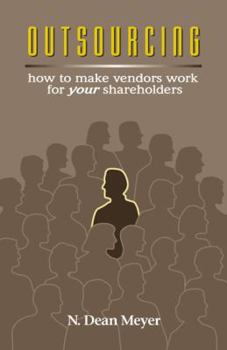Outsourcing: How to Make Vendors Work for Your Shareholders
No Synopsis Available.
Format:Hardcover
Language:English
ISBN:1892606046
ISBN13:9781892606044
Release Date:February 1999
Publisher:Ndma Publishing
Length:106 Pages
Weight:0.35 lbs.
Customer Reviews
2 ratings
Essential Sanity Check
Published by Thriftbooks.com User , 20 years ago
At 106 pages including the index you may be tempted to dismiss this book on a subject that other books with five times the page count fail to adequately cover. Don't.First, this is not a book on the measures of due diligence, detailed advice about vendor selection or even how to build a business case. It is, however, a book that will put outsourcing into perspective, arm you with the right questions you should be asking yourself, your staff, and your vendors, and finally, will cut through the haze and show you a few alternatives.The first chapter covers the thesis - a brief context - followed by another short chapter that defines outsourcing. Then the book delves into the essence and key issues: claims versus reality, the key issues, and the real motives. Not surprisingly, one 'real' motive is an expedient way to get rid of internal service functions with which the 'customers' are dissatisfied. Myer counters that and a few other motives with ideas about how to regain customer focus, control priorities and otherwise how outsourcing can be avoided if the reasons are superficial and correctable. Also promoted is a hybrid solution that uses an extended staffing concept - extend the resources of an internal group with careful, selective sourcing. I've seen this concept work well in practice, but you'd be surprised by the number of companies that do not consider this option. Myer makes a strong case in favor, with diverse examples and alternatives.As the book progresses Myer introduces a strategy, mainly aimed at management of an at risk function, to compete with vendors that provide outsourcing. The material is somewhat brief, but contains enough ideas to get you thinking. As an aside, the ideas in this part of the book are more fully presented, and in a compelling, sensible manner, in Myer's companion book titled "The Internal Economy" (ISBN 1892606186). The final chapter addresses insourcing - going in the opposite direction - and is as thought-provoking as the other chapters.The book is a quick read, but each page will evoke thoughts, ideas and help to place outsourcing in its proper context. Think of it as a decision-aid, and as a way to cut to the key issues. Regardless of whether or not you ultimately decide to outsource, you'll do so with solid information and an objective approach.
Great principles - quick read
Published by Thriftbooks.com User , 20 years ago
This little book will give you the highlights and lowlights of outsourcing without too much pain. Dean Meyer says (and I agree) that outsourcing, under certain conditions, will save money, reduce risks, accommodate peak loads, and develop internal staff and processes. But these benefits come about only if internal staff remains in charge of the client relationships, deciding whether to "make or buy," selecting and managing vendors, establishing strategies and technical directions, defining standards and policies, and seeing that the vendor's knowledge is transferred internally over time.Protect your organization by ensuring that those managing IT delivery work for the same shareholders that you do. Desperate executives, by definition, are not focused on the long term or thinking with a level head. Don't stand by and let them destroy your organization with outsourcing.





